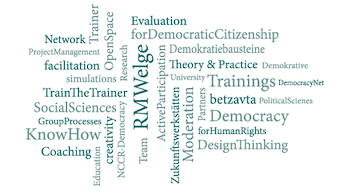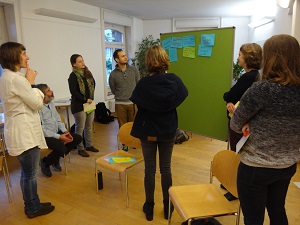 |
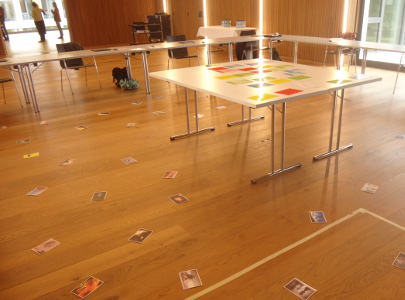 |
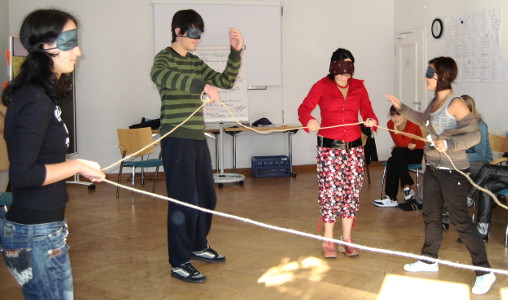 |
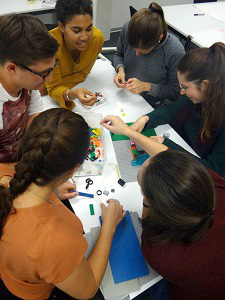 |
Further Training for You and Your TeamContent and methodology are always tailored to the needs, objectives and resources of the client and the participants and may have the following focal points:
A seminar or workshop can already be the right training format for three or more participants, group sizes of about 6-15 participants allow intensive training with room for individual concerns, also larger groups can benefit from participatory seminar concepts and specific large-group formats depending on the spatial and temporal conditions. |
||
Individual seminar and workshop formats on request |
||
|
Please [» contact] me if you are interested in a seminar or workshop format or would like support in designing an innovative workshop concept. I offer seminars and workshops for different target groups. |
||
Exemplary seminar and workshop formatsIn the following I give an exemplary overview of alternative methods for seminar and workshop formats from different areas of application: |
||
|
||
| · | Reflection and critical analysis of fundamental values and conflicting ideals in democracy. | |
| · | Empowerment to take part in shaping our democracy according to one's values and beliefs | |
|
A concept supported by the [» association Demokrative], Building Blocks of Democracy (Demokratiebausteine) [» project's homepage] Éducation21 (education21.ch) has included our module on the subject of "participation rights" in its database of extracurricular actors: [» Link to the database entry] Our work at the NMS Bern has been documented by éducation21 and is available online as a video-supported [» practical example 'Lernmodul Demokratiebausteine am Gymnasium NMS Bern'] (available in DE/FR/IT). |
||
|
||
| · | descriptive tool for planning, monitoring and evaluation of projects in conflict settings | |
| · | systematic analysis of individual project and context components in 7 steps | |
| · | More details on the method [» Do-No-Harm] | |
|
Graduated Do-No-Harm Train the Trainers at KURVE Wustrow (Wendland), 2015 |
||
|
||
| · | training intercultural competence, democracy education and communication | |
| · | experiential group exercises to reflect on one's own attitudes and behaviour | |
| · | dealing with conflict resolution and democratic decision-making | |
| · | developed by Dr. Uki Maroshek-Klarman and the [» Adam Insitute for Democracy and Peace] in Israel and adapted for Germany by the [» Center for Applied Policy Research (CAP)] | |
| · | a list of institutes and trainers working with this method can be found on this [» Betzavta map] | |
|
Train the trainer in 2007, offered by the Centre for Applied Policy Research (CAP) Ludwig-Maximilians University Munich at the Gustav-Stresemann-Institut, Europäische Bildungs und Begegnungsstätte Bad Bevensen |
||
|
||
| · | Group-based method for building our future together in participative processes | |
| · | creative future development in 3 phases | |
| · | also suitable for participatory project planning and activities in the field of socio-cultural animation | |
| Train the Trainer Zukunfswerkstätten according to Robert Jungk & Norbert R. Müllert, cooperation between ZUKUNFTSWERKSTÄTTEN (Marktschellenberg), ecce (Berlin), and the Akademie für soziale und politische Bildung Haus am Maiberg (Heppenheim), 2006 | ||
|
||
| · | Understand and negotiate complex decision-making processes and thus gain a deeper understanding of political structures | |
| · | applied negotiation training | |
|
Facilitating policy simulations at universities and in vocational training in Germany and Switzerland in cooperation with EuroSoc GmbH and Eurosoc#Digital gGmbH since 2009 as part of the Juniortem Europa, Centrum für angewandte Politikwissenschaft (CAP), facilitating policy simulations for pupils in high schools and secondary schools from 2004 to 2006.
|
||
[» back to offers] [» go to project example workshop format] [» contact]


